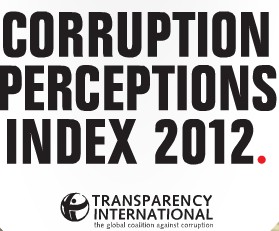Transparency International has release its 2012 data for Corruption Perception Index. The CPI scores countries on a scale of zero to 100, with zero indicating high levels of corruption and 100, low levels. Two thirds of the 176 countries ranked in the 2012 index score below 50 - meaning they are considered significantly corrupt.
Estonian has dropped three places from 29th to 32nd compared to last year's results. Estonia is preceded by Botswana and Spain and followed by Portugal, Bhutan and Puerto Rico. Lithuania is ranked at 48th and Latvia at 54th place. Russia occupies 133rd rank. The lowest scored country in EU, however, is troubled Greece - ranked down 14 places to number 94th. Syria too, presently in the middle of civil war, is down 15 places to number 144, making it one of the most corrupt countries on earth. Egypt, presently in the middle of demonstrations, is down six places to 118 out of 174 countries ranked by the index.
And the most corrupt places in the world are not the most surprising. Unstable governments, often with a legacy of conflict, continue to dominate the bottom rungs of the CPI. Afghanistan, North Korea and Somalia share last place with a score of only eight out of 100 for transparency.
Unsurprisingly, at the top are some of the world's most stable countries - New Zealand, Denmark and Finland are number one. That's a move up of one place for the latter two.
The US has had a larger rise though - up five places to number 19, in contrast to the UK's drop of one place to number 18.
Changes in methodology mean scores cannot be compared, year on year, although the relative placing of each country can be.
The Index, which is closely watched by investors, economists, and civil society campaigners, is based on expert assessments and data from 13 surveys from independent institutions, covering issues such as access to information, bribery of public officials, kickbacks in public procurement, and the enforcement of anti-corruption laws. While critics note that measuring perceptions of corruption is not the same as measuring corruption itself, the latter is almost impossible to do - as the corrupt are usually keen to cover up their tracks, hard data on graft and bribery is notoriously difficult to come by.
http://www.transparency.org/wh...
